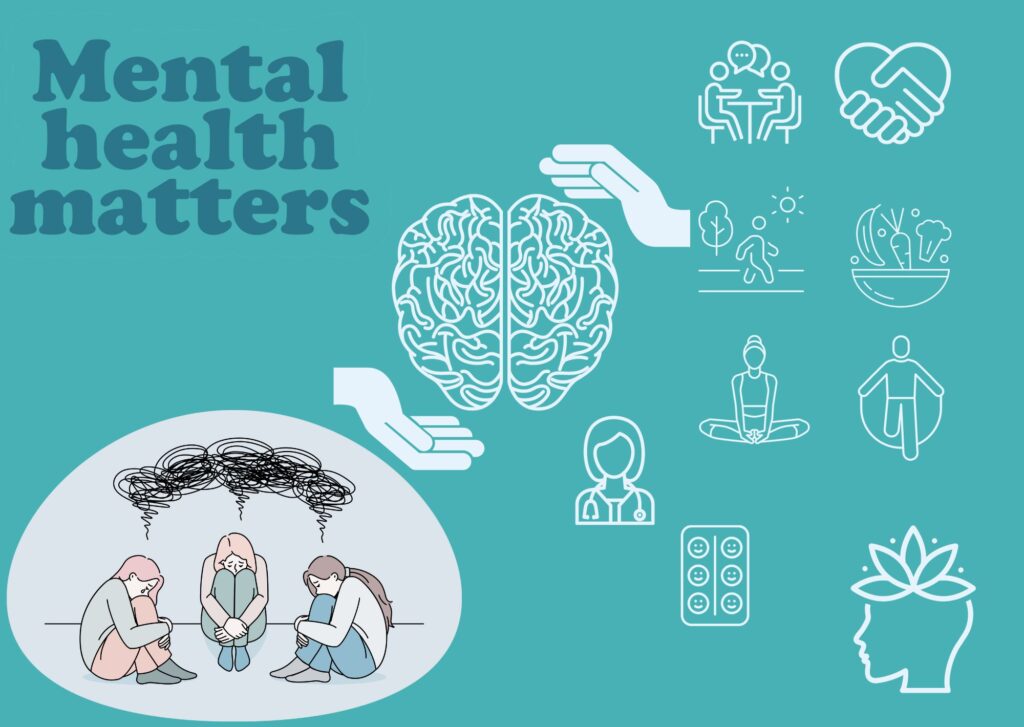The catalysts for deterioration: mental health puzzles
The events of recent years have left a deep mark on our psyche. The safety measures taken to stop the pandemic in the years 2020-2021 have had a significant impact on our lives. Society had to confront lifestyle changes, uncertainty about the future, conflicts, domestic violence, and relationship breakups. This included job loss, difficulties finding new employment, prolonged financial constraints, property sales, and getting into debt. This was the reason for a significant deterioration of mental health, manifested by depressed mood, stress, anxiety, sleep disorders and problems with motivation. In many people, these symptoms persisted for many months, or have persisted to this day (OECD 2022, UCE 2022).

It might seem that returning to a relatively normal life after the release of pandemic restrictions will also restore mental balance in society, but we are far from balanced. The state of the mental health of the population is worrying at the moment. It is devastating that the incidence of mental health disorders has doubled in some EU countries. What’s more, this frequency has not fallen to pre-pandemic levels (OECD 2022, TUW 2022).
In addition, the effects of the pandemic have not yet passed and there are already problems arising from the war at the beginning of 2022. The refugee crisis, economic tensions related to the embargo and restrictions on supplies, as well as deepening inflation resulted in an increased sense of uncertainty, powerlessness and instability (UCE 2022). Difficulties in returning to mental health are multidimensional. Firstly, society grapples with deep-seated negative emotions and the enduring impact of prolonged stress. Secondly, the current economic situation in Europe hinders a swift recovery to equilibrium.
Mental health challenges
Panic and fear of what the next day will bring, limiting direct contacts with other people, so necessary for maintaining mental health, and finally economic collapse – these are factors that can ruin our psyche day after day. Pandemic restrictions are long behind us and it can be considered that we have returned to pre-pandemic normality, but mental health has not returned to its former state. Attention is drawn to the prevalence of everyday functioning disorders. These include coping with duties, satisfaction with tasks, somatic symptoms (headaches, exhaustion, weakness, subjective malaise), as well as anxiety and insomnia. This is because in prolonged stress, the adaptive capabilities of the human psyche begin to run out. Such chronic exposure to stress increases the risk of developing depressive and anxiety symptoms and disorders by limiting cognitive and social functions (Gromulska 2010).
Based on these observations, it can be inferred that over the course of roughly two years marked by pandemic-induced challenges and restrictions, numerous individuals have undergone a form of trauma. This distinct phenomenon can be identified as ‘Post-Pandemic Stress Disorder (PPSD). The symptoms of PPSD are primarily anxiety, low motivation, negative thinking, feeling of powerlessness and constant struggle with adversities, sleep problems, appetite disorders, numbness, irritability and anger, and social withdrawal. It is astonishing that social isolation and constant stress lead to secondary avoidance of social contact (Łaskawiec 2022).

In addition to typical depressive symptoms, we are seeing an increase in the incidence of self-harm, suicide attempts, alcohol and other psychoactive substance abuse, and also violence (UCE 2022).
The effects of chronic stress are extensive and can also lead to other diseases – not only mental ones (TUW 2022).
A common effect of chronic stress is headache, which can progress to photophobia or even migraine (Patel 2022). However, you must be aware that problems resulting from constant tension can be much more serious.
Daily stress can induce oxidative stress in the body. Over time, this can diminish the body’s capacity to regulate reactive oxygen species (free radicals) generated during metabolic processes and the elimination of toxins from the bloodstream. Antioxidants, responsible for detoxification and tissue repair, play a critical role in this balance.
An imbalance between oxidants and antioxidants has serious health consequences. This can lead to, among others, atherosclerosis, stroke, heart attack, coronary arrest, hormonal disorders (thyroid diseases), autoimmune diseases, Parkinson’s disease, Alzheimer’s or cancer (Sharifi-Rad 2020, Pizzino 2017, Macvanin 2023). Unfortunately, we could list the list of disorders for a long time to come. The described increased level of stress with a whole range of its consequences also has a significant impact on the increase in unemployment or professional burnout.
Post-covid mental disorders in numbers – a glimpse on costs and forecasts
Mental disorders cause significant disability, which translates into the employee being less productive or even unable to work. The growing number of medical leave due to depression or chronic stress can generate significant costs for employers and the global economy. The World Health Organization has estimated that the global economy loses €1 trillion annually due to the depression (OECD 2022).
At present, the World Health Organization (WHO) ranks depression as the fourth most significant global health concern. Projections indicate that by 2030, it could become the most prevalent diagnosed condition worldwide.” (UCE 2022).
The deterioration of mental health is reflected in the increase in consumption of pharmaceuticals indicated for treating depression and anxiety. In Poland, monthly consumption of antidepressants and antianxiety medication increased by 50% from 2018 to 2021 (Krupa 2022).
The limit of human endurance
It is believed that the effects of the pandemic negatively affected the psyche mainly of young people. Their psyche, not fully formed, suffered the most from isolation and chronic stress (OECD 2022, TUW 2022). It is frightening that suicide attempts among children have increased several times compared to the pre-pandemic level. Such a huge increase was not observed in any other age group (Bersia 2022). Undoubtedly, the elderly are also a group that is significantly affected by the pandemic. It results mostly from deterioration of general health, worse course of treatment and increasing mental problems, mainly depression. Restricting contact with family, including caring for grandchildren, has had a significant adverse effect. Many elderly individuals experienced loneliness even before the pandemic, and the imposed restrictions exacerbated this issue considerably (TUW 2022, UCE 2022).
Don’t let stress eat you up
The problem with mental health in society as a result of chronic stress is therefore a fact, a legacy of recent uncertain years. Luckily, many European countries now have mental health prevention and promotion programs in place, including strategies or programs targeting children and young people (Javakhishvili 2022).
One crucial strategy in mitigating the health repercussions arising from mood and mental health disorders is social support.
It is considered the most effective way to deal with chronic stress:
- Maintaining social contacts
- Healthy, uninterrupted sleep
- Physical activity
- Techniques of coping with stress and calming down in difficult situations (calming breathing, meditation)
- Appropriate diet, especially rich in B vitamins and omega-3 fatty acids
- Over-the-counter active ingredients (e.g., extracts of Ashwagandha, hops, lavender, valerian, lemon balm, as well as magnesium)
- Consultation with a specialist
One crucial strategy in mitigating the health repercussions arising from mood and mental health disorders is social support.
To prevail in the fight against the growing crisis of deteriorating mental health, it is necessary to widely promote these methods of coping. They must be presented as readily achievable, with obstacles quickly eliminated and greatly expanded access.
In conclusion, we undoubtedly have a problem with deteriorating mental health in society. The level of health needs is very high and will have to be met. Fortunately, we can and should fight the effects of the pandemic, not only in the economic sphere, but above all in the sphere of our own mental health. The more that we know how to do it. We must believe and do what we can to stop the deepening degradation of mental health and gradually restore the life balance we all need.
Bibliography:
- Bersia M, Koumantakis E, Berchialla P, Charrier L, Ricotti A, Grimaldi P, Dalmasso P, Comoretto RI. Suicide spectrum among young people during the COVID-19 pandemic: A systematic review and meta-analysis. EClinicalMedicine. 2022 Dec;54:101705.
- Gromulska. Mental health in the world according to who documents. Przegl epidemiol 2010; 64: 127 – 132.
- Javakhishvili JD, Arnberg F, Greenberg N, Kazlauskas E, Lotzin A, Xavier M. Dealing with the COVID-19 pandemic in Europe: five lessons from the European Society for Traumatic Stress Studies. Eur J Psychotraumatol. 2022 May 3;13(1):2046330.
- Krupa D, Czech M, Pinkas J, Mosiołek A. Impact of COVID-19 Pandemic on the Use of Antidepressant and Antianxiety Pharmaceuticals as Well as Sick Leave in Poland. Int J Environ Res Public Health. 2022 Feb 14;19(4):2135.
- Łaskawiec D, Grajek M, Szlacheta P, Korzonek-Szlacheta I. Post-Pandemic Stress Disorder as an Effect of the Epidemiological Situation Related to the COVID-19 Pandemic. Healthcare (Basel). 2022 May 24;10(6):975.
- Macvanin MT, Gluvic Z, Zafirovic S, Gao X, Essack M, Isenovic ER. The protective role of nutritional antioxidants against oxidative stress in thyroid disorders. Front Endocrinol (Lausanne). 2023 Jan 4;13:1092837.
- OECD. Health at a Glance: Europe 2022, State of health in the EU cycle.
- Patel UK, Mehta N, Patel A, Patel N, Ortiz JF, Khurana M, Urhoghide E, Parulekar A, Bhriguvanshi A, Patel N, Mistry AM, Patel R, Arumaithurai K, Shah S. Long-Term Neurological Sequelae Among Severe COVID-19 Patients: A Systematic Review and Meta-Analysis. Cureus. 2022 Sep 28;14(9):e29694.
- Pizzino G, Irrera N, Cucinotta M, Pallio G, Mannino F, Arcoraci V, Squadrito F, Altavilla D, Bitto A. Oxidative Stress: Harms and Benefits for Human Health. Oxid Med Cell Longev. 2017;2017:8416763.


